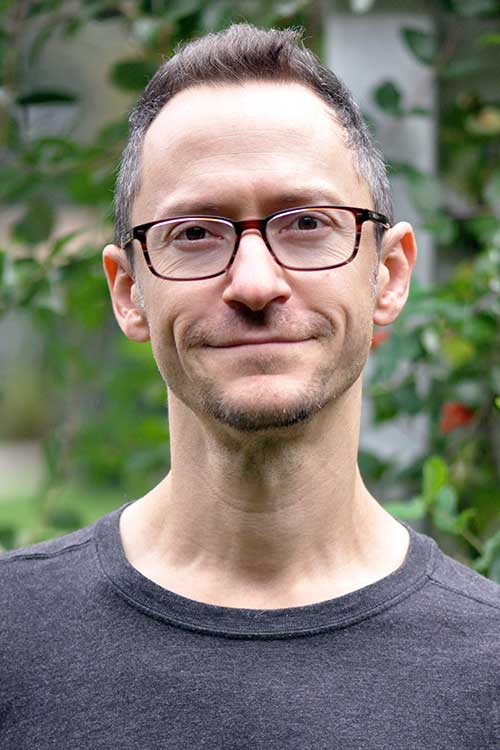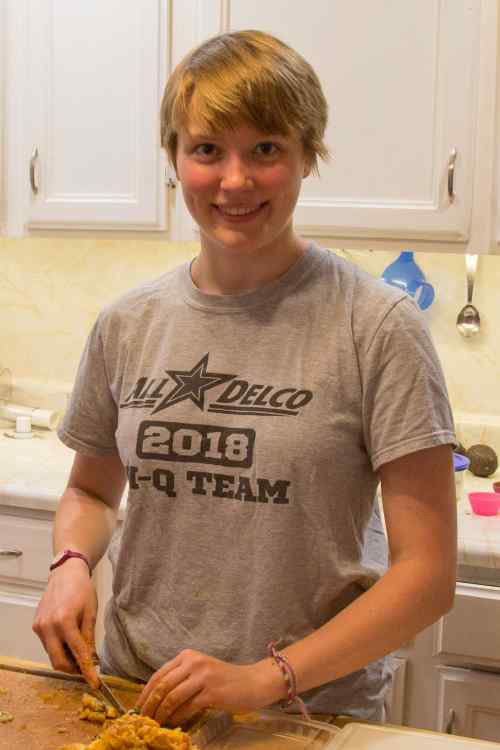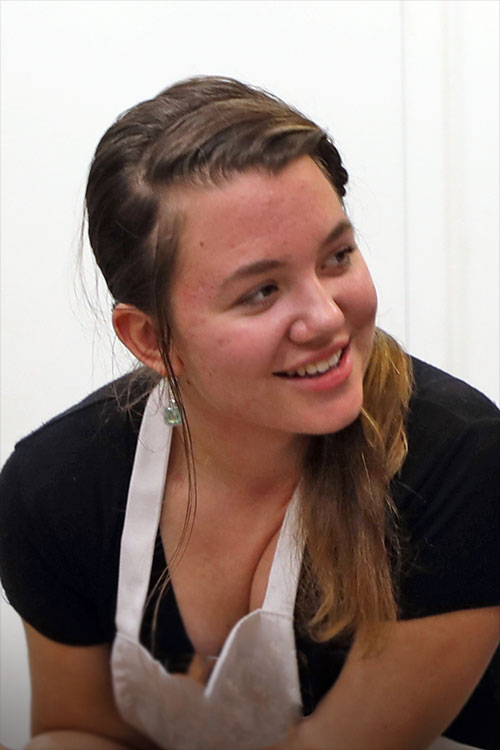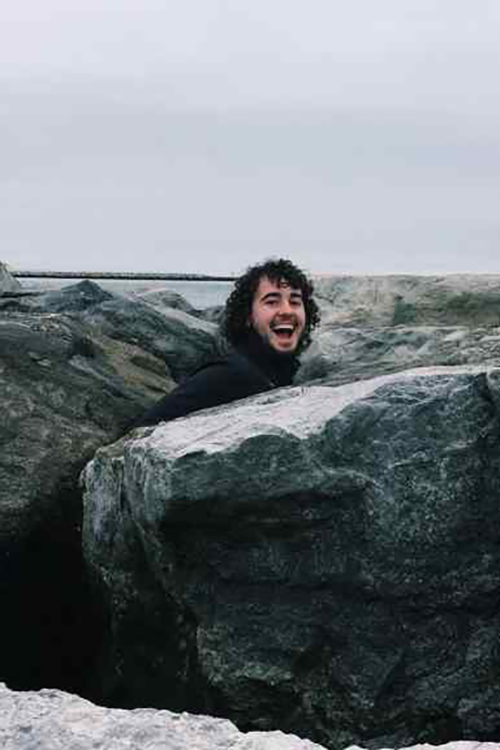Food Initiative
 The Nutrient-Dense Dorm Nourishing campus life.
The Nutrient-Dense Dorm Nourishing campus life.
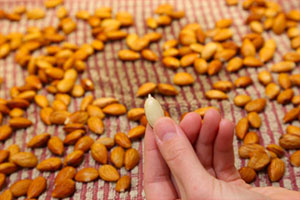 Reconnect with food Tips, recipes, and methods.
Reconnect with food Tips, recipes, and methods.
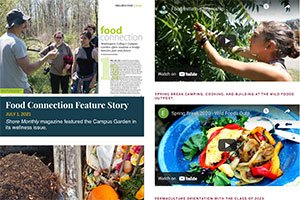 Follow the action News and videos.
Follow the action News and videos.
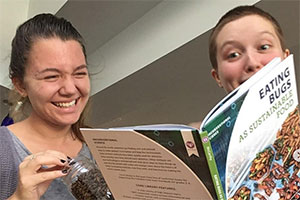 Feed your mind Recommended media.
Feed your mind Recommended media.
Our Practices
We follow regenerative rhythms that nourish life processes. Our activities include fermentation, baking in our earth-fired oven, researching and using wild foods, sharing nutritional and culinary wellness expertise, and building soil to rejuvenate our efforts.
We Live Our Work
We share a passion for healthy food that honors our cultural, ecological, and ancestral heritage.
Our Impact
As colleges around the country take a stance on local and organic food while grappling with issues of food security, sustainability, and waste, Washington College occupies a special place in that dialogue: our location on the Delmarva Peninsula sits within the largest contiguous tract of farmland in the mid-Atlantic region. And our waterfront campus connects us to the storied seafood culture of the Chesapeake Bay.
Today, the poultry industry dominates agriculture on the Delmarva, with feed grains grown in the northern parts supplying chicken farms and processing plants further south. While this industry generates jobs, it also contributes to air and water pollution. And despite the prevalence of farms, food deserts beset by poverty comprise large areas of the region.
Our participation in the web of life preserves the integrity of the systems that support us. By regenerating soil and promoting nourishment with local and seasonal food produced through sustainable methods, we encourage a pattern of living that improves the well-being of our bodies as an expression of the environment.
This plan articulates Washington College’s commitment to transform the Delmarva food production and distribution systems by leveraging its institutional influence in the purchase, consumption, and disposal of food. Our priorities reflect strong ecological and community health values, with attention to fiscal sustainability and civic responsibility.
Background & Current Status
The campus culture at Washington College has a considerable amount of excitement around the idea of food sustainability, which has efforts led by various groups and organizations.
Dining Services relies on outside vendors to produce, prepare, and distribute food. Our current vendor, Chartwells, builds into its operations a program to reduce food waste and educational materials to support sustainability. Current efforts include procurement from the Monterey Bay Seafood safe list, reusable takeout containers, Fair Trade coffee, and purchasing from local farms whenever possible.
The Food Initiative, directed by staff and interns within the Office of Sustainability, advocates for nutrient-dense whole foods, culinary wellness, and food literacy to promote a regenerative relationship between human health and the environment.
The Center for Environment & Society (CES) provides signature programming connecting food and environment, including the Chesapeake Semester immersive experience for students. CES runs co-curricular programs at the River and Field Campus, a 4,700-acre living ecological lab, that has plans to add a Student Farm in the future.
The Student Environmental Alliance (SEA) launched a campus chapter of the Food Recovery Network. Students collaborate with Dining Services, the Heron Point retirement community, and local nonprofit organizations to donate prepared, but uneaten, meals to local residents in need.
The Campus Garden, located at the northeast corner of campus, is a permaculture demonstration site of a perennial forest garden that promotes a revival of the sacred and staple foods of indigenous peoples. Its mission is to achieve food security through ecological design. It has prompted the elevation of marginal campus areas into Green Spaces with an eye toward outdoor recreation and landscaping with perennial, native, and wild foods. Our Tree Campus High Ed certification presents an ongoing opportunity to celebrate the abundance of a ecologically stewarded campus landscape.
The Compost Team feeds the food web by restoring soil fertility through organic amendments generated through campus food scraps. Students lead the way in advocating for organics recycling and providing educational programming at their demonstration composting site.
Our Vision
Washington College will address issues of sustainability, food access, and dietary and social health, providing a model that other institutions can emulate to support human communities and ecological resilience.
Our Mission
Transform the culture at Washington College to position the institution as a national leader in our sustainable food policies and practices.
Objectives
In accordance with our mission and vision, we'll know we're making progress as we:
I. Create a new culture of eating and food literacy.
- Address campus hunger and food access issues with a campus food pantry.
- Enable people to take charge of their health through food.
- Phase out the distribution of containerized water and sugary drinks.
- Transition to regenerative, health-promoting cooking oils and fats.
- Promote the benefits of nutrient density, bioavailability, and food variety.
- Host monthly foraging walks for campus community to learn edible plants.
- Run a community book club to promote the local exchange of ideas.
- Promote student jobs and internships with local food producers and providers.
- Host an annual food summit with partner institutions and organizations.
II. Become a zero-waste campus and community.
- Run a Zero Waste Move-in program for new students each fall.
- Support the redistribution of uneaten food through the Food Recovery Network.
- Support the Compost Team to elevate the recycling of organics.
- Promote reusable cups and compostable take-out containers.
- Promote alternatives to yogurt cups, soft drinks, and snack bars.
- Introduce a purchasing policy that avoids disposable packaging.
- Purchase from distributors that offset the majority of their carbon emissions.
- Use cleaning products that avoid waste and environmental toxicity.
III. Promote scalable food production through edible landscaping.
- Invite students, faculty, and staff to participate in campus food production.
- Promote pollinators in food production as part of Bee Campus USA certification.
- Promote edible plants around campus with pocket gardens and clear signage.
- Introduce “adopt-a-space” opportunities for clubs to steward Green Spaces.
- Establish a campus orchard inspired by historic connection to Sophie Kerr.
- Provide horticultural training guided by permaculture ethics.
- Introduce microlivestock/livestock capacities at Washington College.
- Collaborate with local organizations to support food web resilience.
- Support the development of a student farm at RAFC.
IV. Promote environmentally responsible farming in the mid-Atlantic region.
- Put policies in place to promote the routine use of regional, organic
- Purchase Fair Trade products whenever possible.
- Implement a procurement policy to lead toward bioregional self-sufficiency.
- Purchase animal products from environmentally responsible producers.
- Pursue and exceed Green Restaurant certification standards.
Student Projects
Through the Food Initiative, student leaders implement our food sustainability strategic
plan.
Program Leader: Emma Cease '22
Washington College is home to many passionate environmental activists, clubs, and movements. Until now, most of these groups have made amazing contributions while working independently of one another. By providing coordination and direction through the creation of the Student Sustainability and Food Initiative Director, we hope to make larger and more cohesive impacts on our goal of helping the environment.
This position will also serve as a spearhead for Washington College’s new Food Initiative to continue its growth and influence on the collective health of campus.
Vision
All students attending the college will graduate with a solid nutritional background and environmental awareness to promote optimal health for the rest of their lives. While living on-campus, all students are provided with healthy, sustainable, and delicious food.
Our campus is an attractive space that blurs the lines between the environment and human development through green spaces. The environmental groups on campus regularly work together to make positive impacts on environmental and human health.
Long Term Goals
- Strong relationships and regular collaboration among all environmental groups on campus
- Established curriculum that teaches all Washington College students how to reach their optimal health through nutritional education, sustainable practices, and permaculture principles
- Seamless incorporation of campus green spaces to increase the environmental awareness and health benefits of recreationally enjoying nature
- Campus Dining Hall that provides healthy and sustainable food options that meet all student’s dietary needs
- Required student exposure of the Campus Garden to make them aware of the existence, functions, and opportunities of the space
- Student Director has an increased personal knowledge base of permaculture, nutrition, and environmental sustainability through books, film, and personal experiences
First Steps
- Host Sustainability Council meetings to strengthen the relationship among the environmental groups on campus by increasing collaboration and communication
- Work alongside the Director of Sustainability to evaluate and pinpoint the environmental needs of campus
- Meet with the Dining Hall staff to evaluate the current sourcing and health of food offerings
- Develop resources and host events on-campus that provide nutritional and environmental education
- Increase the functionality and appearance of the Campus Garden through general maintenance and brainstorming of future green spaces
Impact Goals
- Healthy and environmentally-conscious student body
- Easily accessible healthy and sustainable food offerings
- Collaboration and communication among environmental groups to make larger impacts
- Regular student exposure to the recreational benefits of enjoying nature
- Overall “greener” campus atmosphere and appearance
Program Leader: Analiese Bush
Living with a fast-food, ready-to-eat mentality, Americans have lost the fulfilling interactions with food on its journey from field to plate.
The necessity to reunite the consumer with the consumed is increasingly important as hectic lifestyles proliferate. To revolutionize our view of food, the Food Initiative aims to reveal the simplicity of home and community gardening using the Campus Garden at Washington College as a model to demonstrate the extent to which these practices can be taken.
Vision
A bonafide food forest will take root in the soils of the garden previously amended by biodiverse compost. Prominent signage will educate passersby about the plants, the gardening methods, and the permaculture principles at play. Monthly workshops will teach community members about gardening practices that can be adopted on an individual scale. Pocket gardens will emerge and create a campus better integrated with the food it is eating. Fragmented ecosystems will be rejoined by increased edible landscaping and habitat.
Long Term Goals
- Make the garden a more centralized part of college campus
- Spread gardening throughout campus in pop-up and pocket gardens
- Transform the way that we think about the possession of food by creating accessible, public food sources
- Dispel misconceptions about home-gardening, home-cooking, and composting
- Give consumers the power to dictate what they will grow and subsequently eat; foster food independence
- Contribute some of what is grown to Dining Services
- Expand the potentials of the garden through experimenting at the River and Field Campus
First Steps
- Evaluate what students, faculty, and staff want to see in the campus garden
- Make a usable batch of aerated static pile compost to amend garden soils and build biodiversity
- Augment the intake of the community compost bins
- Improve aesthetics and accessibility of garden
- Create signs and structured flow around the garden to better educate students, etc. about the benefits and uses of the plants and gardening methods
Impact Goals
- Encourage healthy lifestyles and informed food choices
- Make food access a matter of conscience and action
- Promote scalable food production from homes to communities
- Showcase and promote the ethical use of wild plants in a diverse diet
- Promote edible landscaping guided by permaculture design process
- Create a completely new culture of eating
Project Leader: Lanning Tyrrel ’22
Before our current era of premade building materials, ready-made houses, and prefabricated tools, when humans moved to a new area, we had to create all of our own shelter and tools and grow our own food.
The skills needed to “start from scratch” have slowly been lost to us as we grow more and more accustomed to having all the jobs required for our survival outsourced to other people. The Wild Foods Outpost reintroduces lost skills and helps people to better understand and appreciate what it takes to support each human by serving as a functioning homestead that creates context through hands-on learning, teaching, connection, and research.
Vision
Construct, over time, a model pioneering community on the River and Field Campus. This main outpost would have capacity for people to live on a permanent basis, and to have other rotating guests who could attend classes and view demonstrations. The outpost will be self-sufficient through food production by means of permaculture and animal husbandry, tool production by way of blacksmithing and casting iron, clothes production, basic boat building. Campus will grow to include permanent living facilities, kitchen spaces, food storage using a root cellar, a barn, a fully equipped smithy, classroom facilities, a smoke house and hide tanning facilities, boat/canoe building dock, and clothes making facilities. Through use of permaculture techniques, the campus will have a sustainable permanent food supply, with enough excess to sell to the community. Animals raised will include chickens, pigs, and goats, with the possibility of sheep and cattle depending on the availability of feed in the environment.
Long-term Goals
- Full-time staff living on campus
- Multi-day overnight workshops available
- Village entirely self-sufficient
- Training for students to start more outposts across the country
- Provide community with sustainably grown and raised food
First steps
- Establish basic shelters at RAFC
- Begin mushroom cultivation
- Begin training in wildcrafting and survival techniques
- Observe plants present in environment and begin identifying what can be added to improve yield and improve soil health
Impact Goals
- Spread the ideas of permaculture.
- Create a sustainable community built from materials gathered from the land.
- Give people the knowledge and skills to create things by hand.
Project Leader: Alaina Perdon ’22
A food desert is defined as an area, especially one with low-income residents, that has limited access to affordable and nutritious food.
In 2010, nearly 30% of Kent county residents were living in a USDA-classified food desert, with the number projected to increase in the coming years. Residents lack a steady supply of nutritious food. A large percentage of this population includes school-age children. Children are crucial elements of the nutrition crisis, not only because they are especially at risk in terms of malnutrition related health complications; but also because, as is frequently stated, “children are the future” — any hope of change lies within the youth.
Vision
A small, student-tended garden will be planted in a public space or learning environment with interactive lessons presented on gardening, sustainability, and healthy eating. Students engaged will not only learn basic gardening practices, but also how to make healthy eating choices — information they can carry through life as well as bring back to their families.
Long-term Goals
- Establish a garden club in which students may tend to a campus garden
- Incorporate edible landscaping across school campus
- Develop system in which students may bring harvested foods home
- Explore indoor greenhouses/aquaponics to ensure year-round growth
- Incorporate composting element to reduce waste
First Steps
- Establish relationship with administrators and determine viable area on school campus or accessible public property
- Give preliminary lesson to students in regards to purpose and benefits of campus garden
Impact Goals
- Help establish food security across economic barriers.
- Promote healthy lifestyle choices through education.
- Expand mission of Food Initiative to general public through youth.
- Ensure project longevity through education.
